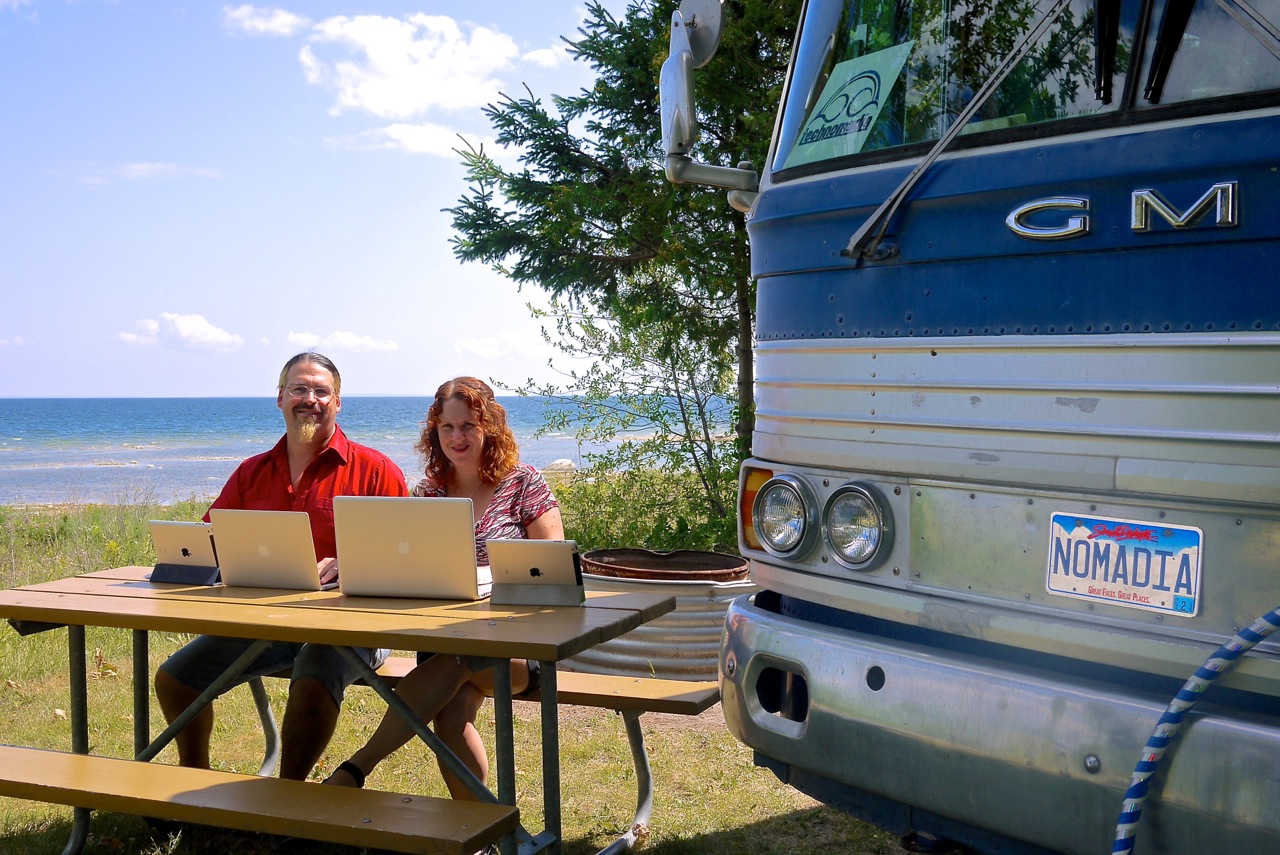
Many people have dreams of long term travel, something that is more than the typical 1-2 week vacation a couple times a year (or every couple of years!).
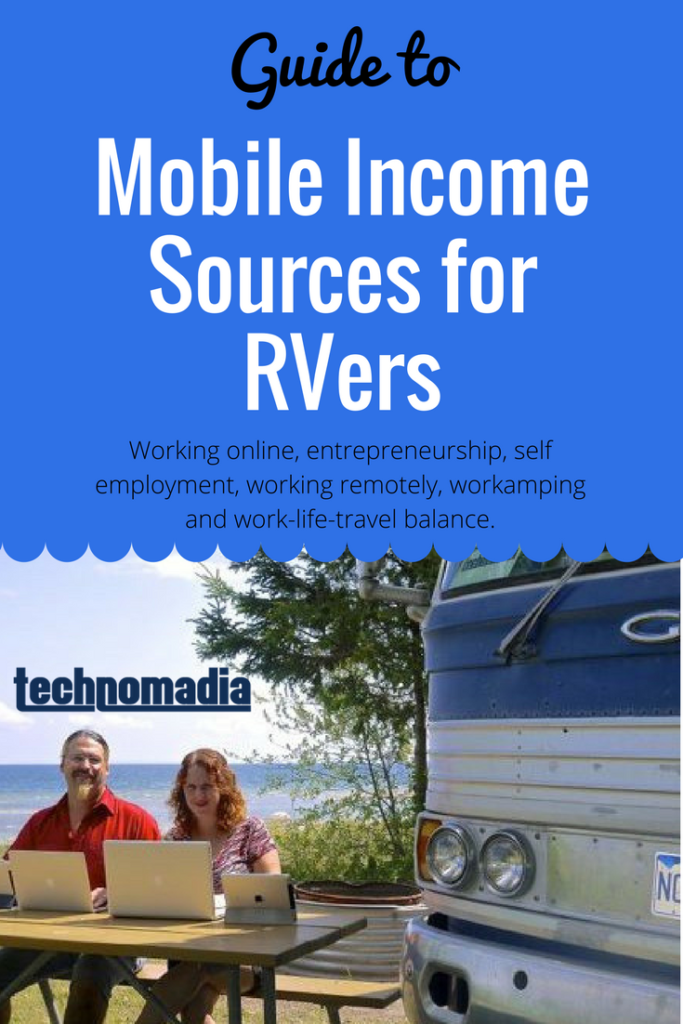 They crave a slower pace to more fully immerse themselves in different cultures and experiences. More opportunity to enjoy quality time with far flung friends and family. A chance for ever broadening horizons, not constrained by a “back to work” deadline.
They crave a slower pace to more fully immerse themselves in different cultures and experiences. More opportunity to enjoy quality time with far flung friends and family. A chance for ever broadening horizons, not constrained by a “back to work” deadline.
That sort of long term travel is generally thought of as reserved for:
- Retirement — when life savings, pensions and social security can cover the expenses, and one has completed a career and put that phase of life behind them.
- Before career – fresh out of school before one commits to a career and family, taking a few months or years to explore the world.
- In between careers – when a current careers is no longer rewarding, quit, take off and travel for a while before re-entering the workforce.
Essentially, extended travel is often to the exclusion of work or career. It’s something you do after you’ve ended a career, or in-between phases of life.
And there’s absolutely nothing wrong with these approaches. Taking time in-between life chapters, and focusing on travel, can give one very deep insights into themselves and the world. Valuable stuff.
But what if now is when you want to travel, not some distant post-retirement future when your health and physical capabilities may no longer be up for the experience?
What if a year just isn’t enough to experience the world?
There is another option.
Combining Career and Travel

Not many of us are in a position to entirely quit the workforce, retire early and sustain our desired lifestyle. Some of us actually enjoy working, embrace our careers, and aren’t itching to escape them. And others, despite vigilant financial planning, haven’t been able to acquire enough savings to travel without some sort of supplemental income.
There are certainly many careers that are not apt to a full time traveling lifestyle. For those passionate about such a career path, that is reason enough to put off full-time travel. In the meantime, find ways to integrate in purposeful travel into your vacation time, sabbaticals, and/or by creatively extending business related trips.
You might be surprised at how much flexibility you actually have – many part-time nomads manage to negotiate time-off (without pay) to turn the typical two week American vacation into two or more months off each year. You never know until you ask, or sometimes issue an ultimatum.
But if you’re not on a stationary career track that inspires you, and travel is calling you louder, perhaps it’s time to explore creative ways to re-think life.
There are generally two different ways to go about earning an income while traveling.
First, find work that naturally integrates in travel.
Or, design a ”location independent” career that involves work that can be done primarily remotely, letting you work from wherever you are.
Here are some examples to get you thinking…
Careers with Travel Built In
A nomadic life based on following the work is nothing new at all – it’s been part of human culture since the earliest adventurers got the itch to explore the world around them.
There are many career paths that can require, or be adapted to, travel as a core component of them.
- Artists & Jewelers
- Musicians
- Entertainers
- Seasonal Workers
- Festival Workers
- Truck Drivers
- Harvest workers
- Oil fields
- Construction and Craftsmanship
- Contract Medical Staff (nurses, doctors, technicians, etc.)
- Journalism
- Photographers
- Disaster Services
- Cruise Ship Staff
- Fishing or Boat Crewing
- Military Service
- Traveling Sales & Demonstrators
- Therapists & Body Workers
- Hair Stylists & Cosmeticians
- Tattoo Artist
- House & Pet Sitters
- Tour Guides
- Amusement Park Staff
- Concessionaires
- Providing Services (cleaning, organizing, computer setup, handyman, etc.)
- Repair & Technician Work
- Temp Workers (from cashiers, stockers to office work)
- Performance Artists (balloon twisters, dancers, comedians, gymnasts, fire swallowers, etc.)
- Conference Speakers
- Field Researchers
- Inspectors & Secret Shoppers
- Onsite Guarding (gate guards, onsite security, etc.)
- Trainers & Teachers
- Teaching English as a Second Language
- Volunteer Jobs (that cover some living expenses)
- Consultants & Designers
- Speciality products sales (ie. Mary Key, Pampered Chef, etc.)
- Workamping
Many of these career paths could utilize travel as part of the means of getting to a work site, but often may require adjusting your travel plans to meet the schedules of work obligations (military service being an extreme example). Some might even require travel away from your RV.
You may have to strike a balance that works for you between giving up control of your schedule and destinations, and having work that actually pays you to travel. And you may have to compromise on where you go if your profession involves local licensing challenges.
Other nomadic career paths allow for travel totally in your control, but you need to have faith that you can show up to a location and market yourself to find gigs or sell your wares.
There are some jobs (particularly in remote areas – such as oil fields, fishing or mining) that offer a rotating schedule of intense periods of work (weeks to months at a time) then lots of time off. Taking a job that involves such hard intense work for a month straight may be grueling, but it is balanced out with time off to travel extensively before you need to return.
Workamping – Combining Work with Camping
While the founders of Workamper.com, who coined the word, intended it to mean any work that is done while staying in a RV, it more commonly is used to refer to work where living in an RV is an asset.
 There are some temporary job positions that are popular with RVers in particular that allow folks to pick up seasonal employment.
There are some temporary job positions that are popular with RVers in particular that allow folks to pick up seasonal employment.
Some positions will pay a wage, and some just offer a free campsite.
Paying positions include working at an Amazon.com fulfillment center via their CamperForce program, in which RVers get their campsite paid for and receive an hourly wage for helping fulfill orders. There’s also sugar beat harvests in the northern states, working at amusement parks, working for a concessionaire at national parks, working special events across the country, being part of a sales team and gate guarding in the oil fields.
Some RVers are able to make a sustainable income out of moving between these sorts of jobs throughout the year, especially if their living costs are low.
Some campgrounds also will exchange hosting duties – registration, office work, maintenance, cleaning – for a campground site and/or wages. Some might even pay a wage for work done over a certain number of hours.
There’s also other volunteer positions available within public park systems that could range from interpretive hosts, campground hosts to grounds keepers. And then there are also opportunities to caretake someone’s property while they are out of town, which could range from tending the gardens, pet sitting or just providing a bit of security.
It’s very important when considering a workamping position if the compensation is worth the hours you put in. For instance, a campground might offer you a free spot that they normally charge $500/month for – but is requiring a total of 30 hours a week of your time. Do the math – that’s just over $4/hour, well below minimum wage.
If you need to earn a livable wage to pay your bills and build your savings, trading your time for a free site may not be worth your time. In such case, seeking out temporary employment positions in an area and paying for your site might turn out to be a much better financial outcome.
But if reducing your living costs is your goal while you perhaps work on other income earning opportunities or supplement other income sources, it may be worthwhile. Especialy if there are other perks with the position that are worthwhile to you – such as free propane, laundry, discounts to local attractions or more. Maybe one member of the household can provide the workamping hours to reduce living expenses, while the other concentrates on bringing in income – such as remote working or building up a business.
Or perhaps you’d like to volunteer your time at a public campground or park – then it’s not necessarily about the money or cost savings, but for the experience and the joy of volunteering.
If these sorts of positions are of interest, get involved by searching for Workamping’. There are lots of forums, listings and resources available for tracking these positions down.
Here are some resources to help get you started:
- https://xscapers.com/x-job-board
- http://www.workamping.com
- http://www.work-for-rvers-and-campers.com
- http://www.coolworks.com
- https://my.usajobs.gov/
- http://www.caretaker.org
- http://www.amazon.com/camperforce
- http://www.sugarbeetharvest.com
Also check out each state’s park system website, many offer volunteer opportunities for RVers.
Remote Work Ideas
With the advent of wireless broadband, there’s a whole new class of mobile careers available. They’re digital nomads and location independent professionals – or as we prefer to call ourselves, technomads.
Some examples of careers that can be done remotely from anywhere with decent connectivity might include:
- Programmers
- Developers
- IT managers
- Database managers
- Bookkeepers / Accountants / CPAs
- Lawyers
- Personal Assistants
- Web Designers
- Writers
- Editors
- Bloggers
- Podcasters
- Photography (journalism, portrait, stock, artistic and training)
- Audio (voice over, audio books)
- Videography (freelance or YouTube ad income)
- Affiliate Sales
- Social Media Specialists
- Product Evangelists
- Bargain Hunting & Re-Selling Online
- Online Products & Stores
- Graphic Designers
- Online Professors & Teachers
- Tutors
- Personal and Professional Coaches
- Consultants & Advisors
- Freelance Writers
- Customer Support
- Agents (travel, insurance, etc.)
- Investors / Traders
- Transcriptionists
- Translators
- Researchers
- Content Creators
- Authors
These are folks who can utilize technology to take the office with them untethered by ethernet cables and phone lines. Sometimes people pursuing digital nomadism have existing gigs lined up before they hit the road, and sometimes they search for remote working compatible gigs as needed by searching job boards such as:
- https://xscapers.com/x-job-board
- https://weworkremotely.com
- http://www.craigslist.org
- http://www.elance.com
- http://www.odesk.com
- http://www.vworker.com
- http://www.dice.com
- http://www.flexjobs.com
And some build up their reputation online and in person, and market by word of mouth and social media.
Intersection of your Skillsets & Passions
The above lists certainly aren’t comprehensive of the options. You’re only limited to your creativity, skill sets and passions.
What skills and interests do you have? How can you adapt your skills into a job that allows you the level of travel you desire? Think creativity about what you can offer that would work with a mobile lifestyle. Just because you’ve always worked at a single location, doesn’t mean that’s the only way your skills can be put to use.
 What resources and contacts do you have in your industry that you can utilize to network?
What resources and contacts do you have in your industry that you can utilize to network?
What is going to light your passions up and provide you incentive to get out of bed in the morning and put in work hours while you’re in a tempting new location that you really want to go out and explore?
Brainstorm, and don’t let anyone tell you your idea isn’t worthwhile exploring. Just because you don’t know of someone doing it now, doesn’t mean it’s not possible. You and your passion is what might make it possible.
You may also find that one single income source is not reliable or robust enough, and that exploring multiple income streams provides you a better income base.
Such as combining campground hosting for several hours a week to reduce your living expenses while working on your next online business venture. Or taking several weeks to work for a wage at places like Amazon or a harvest to build up some funds, that allow you more creative time later to work on deploying a new product or service.
Having multiple income sources also means if one goes away, you don’t have all your eggs in one proverbial basket. You can more quickly rebound, and find ways to adjust to the new income levels.
Think creatively. Maybe you have a job that lets you work remotely part of the time, but really needs you onsite from time to time. How can you combine your reality with your dreams?
Can you compromise your travel desires by limiting them geographically so you can easily return back to your job’s location when needed? Or how about planning to fly out to your shorter term work obligations instead of always planning to drive there in your RV?
Remote Employee
As the world has become more and more virtual, and the economy has forced more companies to scale back on the costs of maintaining real estate, more traditional workplaces are becoming keen on allowing their employees to transition to becoming remote teleworkers.
So why not take it a step further, and work from anywhere?
Some companies have even gone entirely virtual – with no fixed office at all.
Of course, not all positions are going to be able to be done remotely, and not all companies are keen on the idea. Particularly factoring the uncertainties that come with working while traveling. However if you have a job that you think you could do from anywhere, you might want to consider coming up with a proposal for your boss.
 Don’t expect your employer to jump right on the opportunity, and expect that you may have to prove you can do it by perhaps starting with working from home on occasion. It is possible however, and really all depends on how open minded your workplace is, your history as a reliable employee and how critical your role is to your organization.
Don’t expect your employer to jump right on the opportunity, and expect that you may have to prove you can do it by perhaps starting with working from home on occasion. It is possible however, and really all depends on how open minded your workplace is, your history as a reliable employee and how critical your role is to your organization.
It likely won’t be an overnight transition, but if you like your current career and job but just want to do it from anywhere – think creatively on how you can make it happen.
If you are willing to negotiate a lower salary in return for fewer mandated office hours and more travel flexibility, you might be surprised as to what your company might agree to.
If you’re wanting to pursue this path, think hard about if you’re self motivated enough to get your work done while working not only from home, but a home that is constantly moving with lots of potential distractions at every stop.
Will you really be able to balance productive work hours, with driving days, exploring new locations and visiting friends & family?
If you’ll be traveling with other people – such as a spouse and kids, will you be able to create a workspace inside of an RV that gives you ample amenities, privacy and space to get your work done?
And if your job require you to remain accessible by phone, video conferences and/or internet, will you be able to maintain the level of connectivity you need while on the road? If your job specifies you have a physical land line phone connection (not a cellular phone), you may be out of luck with that position being mobile friendly.
And of course, there are lots of employment and contractor positions out there that require travel – such as sales, service, installation, inspection, security, demonstration and field research. These sorts of organizations usually already have awareness of RV & traveling workers, and probably have some support services that come along with the job to help you better navigate the logistics.
Not quite ready to tackle finding remove work on your own? Here’s a resources you might want to look into for assistance:
- Remote Work 101 Course – By corporate trainer and full time RVers Camille Attell
Entrepreneurship
 On the other hand, not working for someone as an employee can be very freeing.
On the other hand, not working for someone as an employee can be very freeing.
Do you have ideas for products or services you can provide on your own and/or with peers? Do you have the motivation, skillsets and self-discipline to create, market, manage and ride the ebbs and flows?
You might be cut out to be an entrepreneur.
Many folks who have hit the road were either already self-employed, or explored it as part of a life transition to location independence.
Living on the road has a lot of benefits that support exploring entrepreneurship, such as the variability of costs from month-to-month, and potentially flexible hours.
It also means being quite disciplined and resourceful to both find work and keep your clients happy, as well as figuring out all of the logistics of running a company – paperwork, taxes, accounting, healthcare, insurance, etc. It can also take quite an investment in time, and maybe money, to get your business to a point of providing the income you want.
If you’ve never run your own business before, it may be daunting to approach learning the ropes while also adapting to a fully mobile lifestyle. Or it might be exhilarating, some folks thrive on a total life reset.
How much of a change you’re up for is going to vary quite a bit by person, skills, risk factors and tolerance.
- The RV Entrepreneur School – By Health & Alyssa Padgett (who run the RV Entrepreneur Summit & Podcast)
Secure your mobile income first, or later?
Is it better to have your mobile income source secured first, or figure it out once you’re on the road?
Honestly, that really comes down to how much of a nest egg you have to fund your uncertain months, and how adaptable you are in making things work out.
If you already have an income source that can be taken mobilely, the answer is easy – start doing the work to transition yourself to location independence… and get out there already!
 If you have an income source that won’t be apt for mobility, do you have ideas to pursue that you can start implementing now to see if they work?
If you have an income source that won’t be apt for mobility, do you have ideas to pursue that you can start implementing now to see if they work?
What can you be doing now to better position yourself, while you still have the income coming in?
Are there classes you can take to pick up new skills? Can you apprentice and or volunteer to gain new experience?
How can you think differently about your current career path to adapt it for life on the road?
We also have a lot of folks ask us what degree they should go get so they can better create a mobile income. Folks, there’s no ‘mobile income’ degree out there (maybe we should sell one? hmmm.. there’s an income idea!). What will work for you as a mobile income out on the road comes down to one thing – you. What are your skills, interests and passions.
Honestly, you should start with what you want to do for income – and then pursue degrees and certifications that might be necessary to achieve your goals. Not all, heck most, career paths don’t require a degree, especially if you are pursuing self-employment. And many people with degrees are on career paths divergent from their degree anyway.
Invest your time and money in gaining skillsets, and only in degrees & certification if they are required or expected for your chosen field. There are a lot of free college level classes you can take online from www.Coursera.com, Stanford, MIT and iTunes U, and probably affordable classes within your local community too.
One word of caution here – changing your life to mobile AND setting up a brand new income source are both two major life transitions. Each individually will take adjustments and have their growing pains. If you choose to hit the road without a mobile income source flowing in, we highly advise that you have the funds or plans necessary to support yourself for up to a year or more as your figure it all out.
Life on the road can be mighty distracting – so many places to explore, people to meet and balancing work/travel is a difficult transition. Trying to find the mental bandwidth to forge a new career path along with the excitement of perpetual travel aren’t necessarily good companions in the beginning.
And the cost of travel in the first year can generally be more expensive as folks tend to take a faster pace resulting in more fuel costs and higher nightly rates at RV Parks and campgrounds. When you slow down your pace, the costs can go down. Way down. And you have more time to work on your income source.
If you can afford to do so, enjoy the first few months on the road as more of an extended vacation – and then buckle down on creating and sustaining the income source you need to sustain your newfound love of the road. If you can’t afford that time, then make sure you try to approach this new lifestyle realistically.
Working less or working smarter?
After Timothy Ferris’ book The Four Hour Work Week came out, a bunch of folks got the notion that they could set up online businesses, outsource the bulk of the work, and only work 4 hours a week while earning a bunch of cash and playing the rest of the time.
Sure, it may be possible for some, and there’s good stuff in Tim’s book that can really help folks think differently about the role work plays in their life.
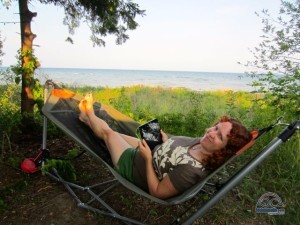 Just don’t get the idea that life as a nomad is always a full time vacation. It takes a lot of work to set up and maintain a passive income stream – so much so that for most it’s really hard to call what they end up doing all that passive.
Just don’t get the idea that life as a nomad is always a full time vacation. It takes a lot of work to set up and maintain a passive income stream – so much so that for most it’s really hard to call what they end up doing all that passive.
Most of the mobile working nomads we’ve encountered don’t have a life of complete leisure or a passive income stream. True, we may not be always working a typical 40+-hour work week plus commute, but we are putting in productive hours with deliverables. We just tend to do it smartly without all the wasted time that tends to come with an office life.
Many of us are working in careers that inspire us in some way, better the world and that we actually enjoy. And we’re doing it from amazing places with ever-changing amazing office views. Instead of ending our workday (or night) and coming home to the same old routine, we have a new location waiting for us to explore!
We’ve encountered such a variety of ways people make it work – from working a fairly normal work day, to those that work in waves of intense 12-15 hour days for a few weeks then coast for months after that.
There’s no right or wrong way to do it. Just make sure it’s YOUR way.
Balancing Mobility & Work
Working on the road may not be as glamorous as it sounds, and it’s certainly not a non-stop vacation. You will have to find your stride to make it work.
You’ll be pulling into amazing new locations and be tempted by a lot of social opportunities as you visit family and are making new friends. Your RV is going to have issues at inopportune times that you’ll have to attend to if you want to keep mobile.
It can be hard to find the time to sit down and get in your work hours with all the constant distractions. Especially in your first months to year on the road when it’s very difficult to differentiate a life of travel from an extended vacation.
We see a lot of nomads give up this lifestyle within the first year or two because this balance is so hard to find. They either exhaust themselves trying to do it all, or they run out of funding because they never struck that balance.
Here’s some tips we’ve found for helping with this:
- Plan some of your travels away from distractions. Instead of constantly exploring pretty places and visiting nearby friends, sometimes it makes sense to set down somewhere that you don’t know anyone nearby so that you can focus.
- Slow down your pace of travel, and stay places longer so you have time to both get in your work hours AND explore the location. Spread out your exploration time just like you do your extra-curricular activities now after your workday.
- Trying to balance motion in with work hours is sometimes just not possible. Making miles takes time, as does setting up, breaking camp and figuring out where your next stop will be. Sometime it makes better sense to just travel a couple hours a day, and sometimes it might make sense to put aside a day where you get a lot of miles in to make major headway towards your next destination.
 Put attention towards your work space. If you need to be at a computer many hours a day, working from a laptop on a picnic table or on the beach may sound idyllic, but it’s just not practical or comfortable long term. And you may find you don’t do your best work from public locations with free WiFi like coffee shops or libraries. Options range from building in a comfortable desk space into your mobile home to arranging to rent in co-working spaces as you travel to urban locations, or borrowing space from friends as you travel.
Put attention towards your work space. If you need to be at a computer many hours a day, working from a laptop on a picnic table or on the beach may sound idyllic, but it’s just not practical or comfortable long term. And you may find you don’t do your best work from public locations with free WiFi like coffee shops or libraries. Options range from building in a comfortable desk space into your mobile home to arranging to rent in co-working spaces as you travel to urban locations, or borrowing space from friends as you travel.- Pad in fun time to explore! Some nomads prefer working in intense focused bursts to generate their income, and then take weeks or months with minimal work commitments.
- And the most important tip of all: Try to switch your attitude of having to work while visiting an interesting new place to getting to work from all these amazing places! Think of it as always amazing office view changes.
More Thoughts: Balancing Work, Life & Travel
Additional Inspiration:

- Join Xscapers – The Escapee’s RV ‘club within a club’ serving the working-aged RVer, providing additional resources about working on the road, technology, legal issues and raising families. They host convergences throughout the year to enable forming community on the road.
- The RV Entrepreneur FB Group – community of ‘RV Entrepreneurs’ hosted by Heath & Alyssa. Also check out their fantastic RV Entrepreneur Podcast,
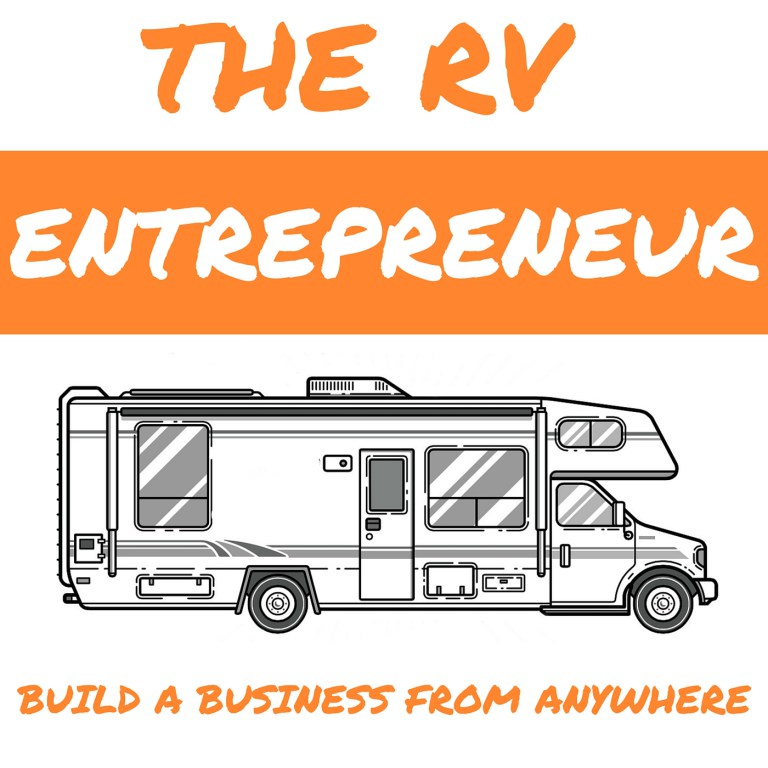 interviewing dozens of amazing working on the road full timers (we’re episode #9).
interviewing dozens of amazing working on the road full timers (we’re episode #9). - We recommend the The $100 Startup book by Chris Guillebeau, we were one of the 1oo case studies about businesses idea that didn’t take a lot of upfront capital.
- Our link list of other working on the road RVersOur ‘Ramblings: Tales from Nomads’ video interview series
- Our casual video chat with our buddies Gone with the Wynn’s on this topic back in 2014:
Our Mobile Careers
Our current income sources didn’t happen overnight, it’s been a multi year evolution. (And despite a common misperception, we don’t consider this blog part of our ‘work’ – it’s a personal passion to share here.)
Here’s a brief recap of how we’ve evolved our mobile income:
I’ve been location independent since 1994 running my family’s software development company from my beachside home in Florida.
 When I needed to travel for work, I’d tack on personal days to explore, taking advantage of the majority of the travel costs having already been covered. Then I started taking longer personal trips where I integrated in a remote work day, and used my off-time to explore.
When I needed to travel for work, I’d tack on personal days to explore, taking advantage of the majority of the travel costs having already been covered. Then I started taking longer personal trips where I integrated in a remote work day, and used my off-time to explore.
I liked the balance of travel just being a regular part of my life and having the flexibility to just go with little need for pre-planning.
When I met my lifemate Chris in 2006 (who was already living as a full time nomad), it all came together for me to totally take my existing business on the road with me.
Before going nomadic, Chris had a career in the mobile technology industry – most recently having worked for Palm and PalmSource as their Director of Competitive Analysis (aka ‘Chief Spy’), traveling the world to keep tabs on the entire mobile tech industry. It was truly a job too good to give up until Palm & Palm Source imploded. He had already long ago decided that this would be his last job for a big company, and his lay off propelled him to finally jump into something he always wanted to do – become a technomad. He had already begun some consulting projects.
 When joined our lives together, Chris and I formed Two Steps Beyond LLC (www.twostepsbeyond.com) to do our joint projects under. Over the years, we’ve transitioned our prior individual work lives into combining our backgrounds to offer unique products and services.
When joined our lives together, Chris and I formed Two Steps Beyond LLC (www.twostepsbeyond.com) to do our joint projects under. Over the years, we’ve transitioned our prior individual work lives into combining our backgrounds to offer unique products and services.
After my father passed in 2013, we shut down the software business that I ran with my family, and our current income sources have been completely built while on the road.
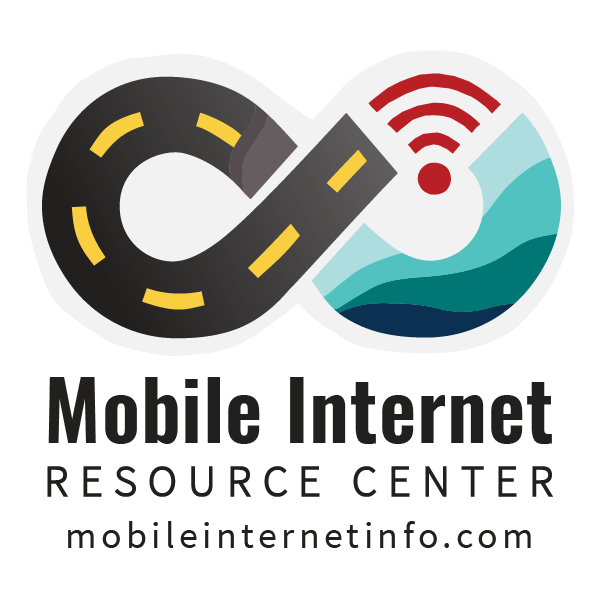
Our current primary income source is hosting Mobile Internet Resource Center, where we provide information to our fellow RVers, cruisers and nomads about keeping connected. It’s all members & reader supporter via premium memberships and sales of The Mobile Internet Handbook.
This has been a perfect confluence of combining our skills, passions and desires for assisting our community by helping others get out here on the road (it’s selfish really, we want more campfire buddies!).
We also have some other more ‘passive’ income earners, including our mobile travel apps (Coverage?, State Lines and US Public Lands), and some trickles of income off our YouTube channels and affiliate sales (we don’t focus on this aspect of our income, it’s more of a hobby.)
We’ve also taken on several short term gigs that have included: advising tech start-ups and companies, orchestrating new product launches (most notably: RVillage and Xscapers), doing intensive market research, product development & project management, providing market insight to investors, selling our photography and travel videography, volunteer interpretive hosting at lighthouses, packing boxes at Amazon, and writing for tech journals.
We like to shake it up, explore new avenues of income, and most of all – have fun!
Further resources on this topic:
Read Chapter 2: Affording Full Time Travel —->
What happened to the eBook version of this series?
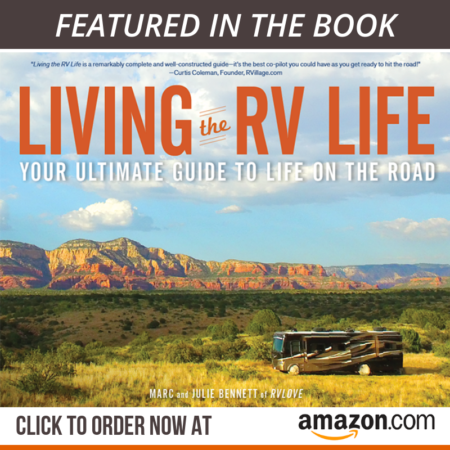
We used to offer an eBook version of this content on a ‘Pay as you Wish’ basis. That book got so out of date and we have no time to keep it updated – so we took it down.
We do our best to upkeep the segments in this blog series, but realistically can’t see republishing the book edition.
In November 2018, RV Love released their brand new (professionally published) book – Living the RV Life. It goes over a lot of similar content to this series (and more) on RVing. We highly recommend picking up a copy!
You’re of course welcome to browse the No Excuses: Go Nomadic series online for more of our tips & tricks on the logistics of nomadic travel.
If you do appreciate this series or the content on our blog, we always LOVE hearing your appreciation – leave a comment, leave a tip (link at bottom of every page) and/or share this post. Thank you!

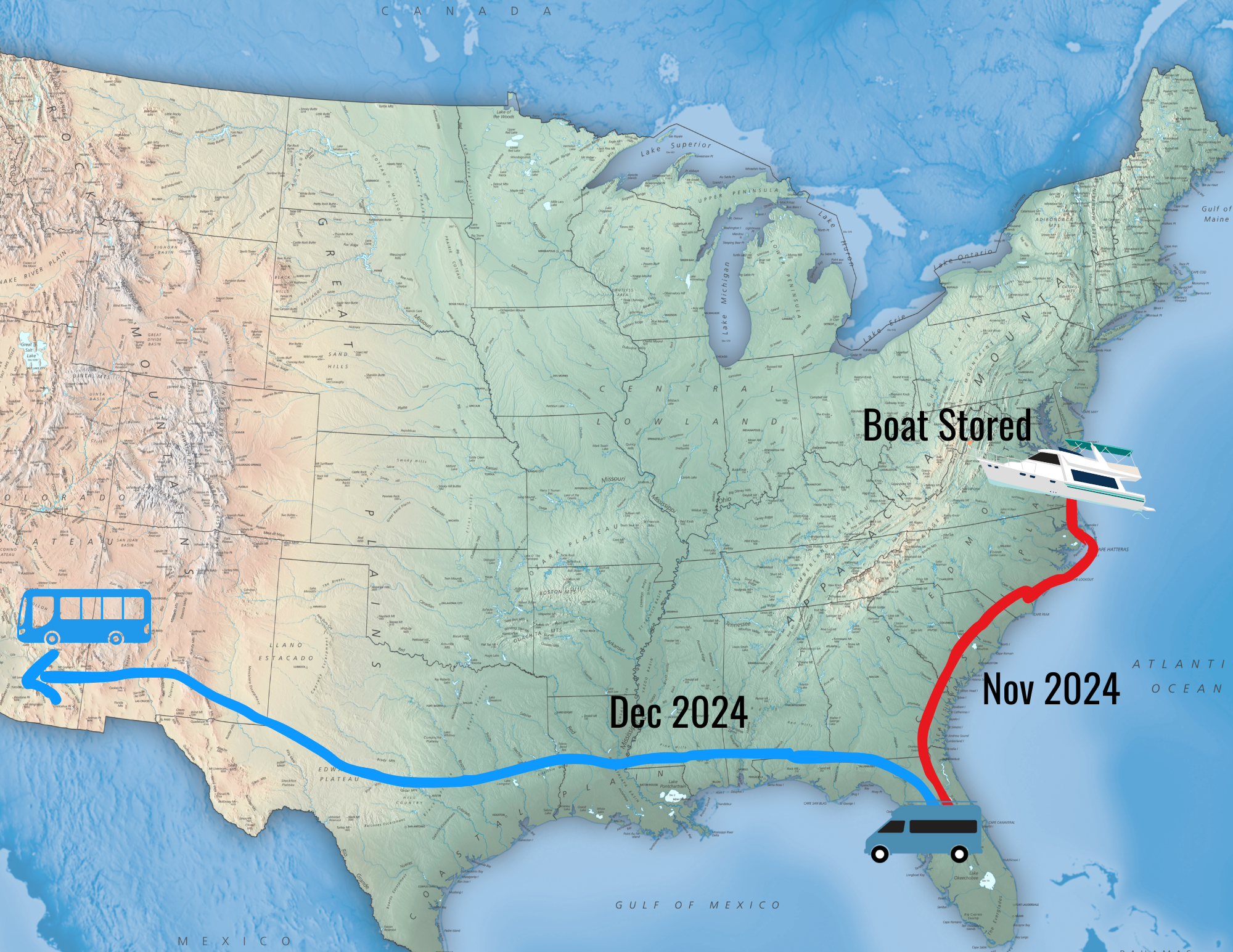
I Loved your article! It was Very Educational, Encouraging and Inspiring!! We have talked for years about being full-time RVers. More recently, we’ve been re-thinking the timeline and approach. We’re in our mid-50’s and homeschool our son who’s now a teenager. We’re realizing that we’d rather transition to a mobile income/travel lifestyle now while our son is young and with us rather than waiting until he’s grown and on his own. This article began a great base for us to build our knowledge on as we put a plan together. Thanks so much for the inspiration and ideas. We’re Excited about All of the Possibilities!!!
Cheri,
Your webpage has given me a better understanding and helpful information looking for online jobs for full-time RV’r.
I took a leap of faith when my husband wanted to sell our homes, quite my job (good income), talking me into traveling and seeing this great country we live in via RV. For I have only camped a few times as a kid was a culture shock of downsizing, many adjustments, most of all feeling isolated from lack of people communication.
Crazy to think that but seeing how others camp is not what it used to be sitting around the campfire as it was when I was a kid.
I will continue to read up and (re)search for jobs that fit into skill of knowledge.
Sincerely,
Maria
Cheri great information…do you have anythinv on retired fixed income RVers?
We can only write about what we ourselves know. Catch us in about 30 years an we’ll have the perspective to add too. In the meantime, checkout http://www.cheaprvliving.com
My husband is a musician and I create natural,wool,and synthetic dreadlocks. We are currently oregon residents trying to kick-start our nomad adventure. We’re trying to decide between domiciling in oregon (our current place of residence) and south Dakota, but in trying to figure it where would be best to set up our businesses we have not been able to figure out anywhere if we will need to get licensed in each city we work in…. do you have any insight to this?
I have no clue about the licensing requirements for your field of work or how you intend to pursue your work (we work entirely online and are really never anywhere long enough to have to consider it) … but for the domicile question: https://www.technomadia.com/domicile
I agree w others. So much to learn. So glad I’ve found you. I don’t have time to burn. I want to start soon but am just starting to get some info. I’m a little scared but also enthused. I live on the So. Coast of Oregon and it’s beautiful here but family is inland and so I’ve bought an old mobile home there. Wish I’d understood this before I did that but, can make the transition, I think, with all your info. Don’t know if I’m going to sell my house or not but would like to get going with the RVing soon. Summer’s a wastin’ so have to decide soon. Sounds like a lot to take on to try to find a rig that I can afford. Thinking of a used Class B to start but would have to put it on credit cards, or sell something. Lots to take in. so many ideas swirling around in my head. Thanks for being there.
Wow! What an awesome nomadic blog! I’ve personally lived in a converted school bus for twenty years. It has saved me a ton of money in rent and other expenses. I just became a full time blogger last month and I’m very excited. Have a lot of work to do before my blog hits this kind of caliber and makes a great steady passive income. Thanks again!
Where do you park the school bus overnight when you are in cities or the suburbs? It seems like RV parks and campgrounds are all there are, aside from maybe Wal-Mart parking lots and BLM land.
Well first all, ours isn’t a school bus, it’s a converted highway bus. When staying in cities and such, we usually find campgrounds or RV Parks near where we are visiting. Sometimes driveway surfing with friends.
We’re not fans of urban stealth camping.. just not our style.
Do you have any suggestions on how to maintain a reliable internet connection while on the road? I’m about to begin working on the road with the company I’ve been with for two years. I don’t want to risk depending on the RV park wifi.
We sure do.. we have an entire website & book dedicated to this exact topic. Get started with our free overview article at http://www.rvmobileinternet.com/overview and our personal setup can be found at: https://www.technomadia.com/internet
So much info to absorb – So many e-books, videos, blogs, and more. The more I read and view, the more I realize how much I don’t know and how much more there is to learn. I think I just need to “Do It”. Thanks to you both for all your efforts and all the info you impart, we hope to meet you on the road sometime.
Awesome info! Thank you!:)))
Great article! Thank you! Reading through all your thoughts & experience is helping break down where we have things already handled & where we need to focus our efforts in prep for being fulltimers.
We are already self employed – my husband does photography / videography, voicework, editing, and teaches on-camera and speaking techniques (almost 30 years experience). I am a lymphatic therapist with 22 years experience. I teach breast health workshops, work with posture, carpal tunnel & other repetitive stress issues, and can heal many things that nothing else will help. I’m writing a book & training other therapists on my healing system.
We both have offices in our home, and spend much of our time together quite seamlessly – balanced with our own interests. My hubby often takes his laptop to Starbucks for the social aspects.
LOL – we are both rather short – he is 5’3, I’m 5’1 so fitting in a small space is less likely to be a problem.
We are debt-free, car is paid off. We rent our home, and have filled it from Craigslist & yard sales with the intention of being able to just put it ALL back on Craigslist & in a big yard sale & walk away. What little we will store will go into a shed we will build on my brother’s property – no storage fees.
My healing system is a teaching program so my patients can do all their maintenance self-reliantly. I already problem solve via skype, and could come through every few months and check on people.
We have just started looking at rvs – we like the Thor Axis / Vegas, and figure by the time we buy they will have the bugs mostly worked out & we can find a used one where someone else does the shakedown trips.
We have begun ‘pretending’ we are already 100% in need of mobile income – I am looking to set up workshops around the country that pay for my travel, and my honey & I both are trying to utilize the mobile work sites you posted. He’s doing our websites for my lymphatic work / workshops, our photography, & his voice talent. He’s training me to do voicework as well.
By the time we have the $ for the RV we should be ready to roll!
We would love your thoughts on our thoughts so far!
Christal_N_David (look us up on Couchsurfing in Louisville – we have room to park & plug in if you want to come visit awhile. We are right off Hwy 64)
Younger workers who full time can financially benefit even if their work does not cause them to be nomadic. In many states there are no ad valor em taxes on RVs. That tax savings in addition to the frugality that RV living encourages means that you can potentially save a lot of money over a lifetime that could be allocated to your own land or a comfortable retirement. For those of us who have to move with frequent job changes there is no better way to live.
Hey guys…just an FYI so you can update your links…it seems that VWorker has been bought out by Freelancer.com and the new link is (how obvious!) http://www.freelancer.com…HTH
Great list! We get asked this question all the time, so I’ll just point people your way. 🙂
In-depth info…you give people all the help they need to get out there and live their full-time dream. Main obstacle: fear. If people could overcome that, the sky’s the limit.
And sure, there may be set-backs, but think of those as challenges to change something.
You two really know your stuff!
Absolutely… that’s what this series all about, demystifying the ‘excuses’ we’ve heard over the years, which are often masks for fear.
So much incredible information so clearly presented – thank you!!
Thanks for the article. We’ve been full-timers for a little over four years and have an open-ended gig as an on-site security team; however, I supplement this with part-time work on oDesk. My current assignment has been running a little over a year now and I enjoy the extra “mad” money, interacting with colleagues and keeping my middle-aged brain active with the work itself and new platforms and programs. I’ve bookmarked a couple of the other virtual/telecommuting links you provided for future reference if needed. I highly recommend oDesk to those looking for work in the virtual world.
Really good post! Were you two in Michigan recently? I read that you were on Lake Huron, which is where I live.
Hi Mary.. we’re actually still in Michigan, working our way up 23 along the Heritage Trail. Heading to Alpena, Rogers City and Cheboygan in the coming weeks, then up into the UP.
Other than your articles I don’t know of any web site where someone who needs or wants to earn money or a camping spot can get such comprehensive information. Great job!
Thank you Tricia.. makes us happy to hear the appreciation!
Great, balanced post on nomadic work opportunities. Another wonderful Technomadia resource!
Nina
Thanks Nina.. we hope that it might help someone out there get started.